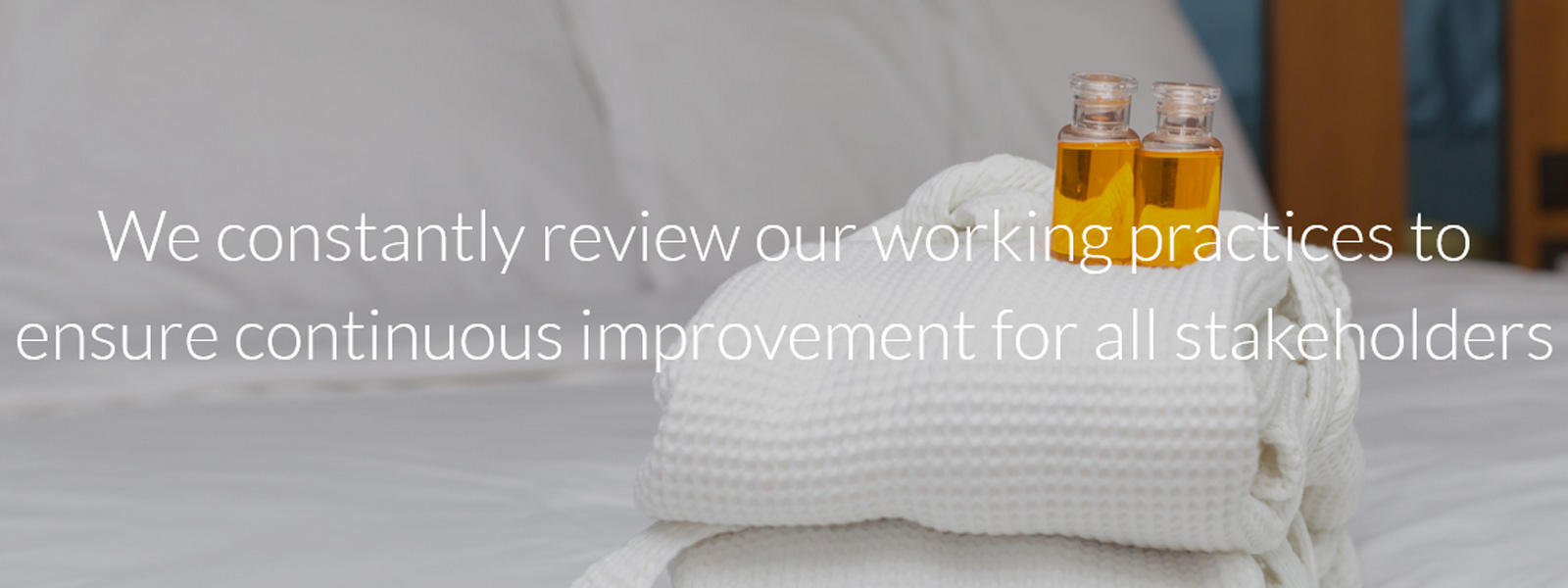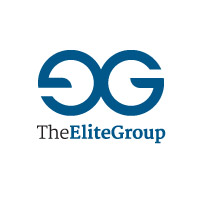
UK Hospitality Ltd Policies
Follwing are UK Hospitality Policies.
Applicable to UK Hospitality LTD
UK Hospitality LTD seeks to be a good corporate citizen in everything that it does. We have therefore determined to bring together our existing operating principles into one framework policy under the heading of Corporate Social Responsibility (CSR).
The principles encompassed in this policy cover all areas of the Group’s operations and have been developed and continue to be reviewed.
UK Hospitality Ltd's Managing Director supports the principles set out in those codes and standards and the aim of this policy is to translate that support into a set of guidelines and standards that set a common approach for UK Hospitality and provide practical guidance for our managers and employees on the ground.
Compliance, monitoring and reporting
Compliance with this policy will be continuously monitored and subject to review by the Directors. Each local manager is responsible for ensuring that the principles set out in this policy are communicated to, understood and observed by all employees and for ensuring compliance in their area of responsibility. Employees who reasonably suspect that there has been a breach of this policy must report it to their line manager, senior management.
We recognise that employees may be reluctant to report concerns for fear of retaliation and will take disciplinary action against any employee who threatens or engages in retaliation, retribution or harassment of any person who has reported or is considering reporting a concern in good faith.
UK Hospitality will not criticise management for any loss of business resulting from adherence to the principles set out in this policy. All sections of this policy are underpinned by the Group’s Code of Business Ethics, which is set out in Section 1. The other areas covered by this policy are Health and Safety and Security (Section 3), Employment (Section 3), Customer and Community (Section 4) and Environment (Section 2).
Code of business ethics
This Code of Business Ethics sets out the standards we expect from our employees in their internal and external dealings with colleagues, customers and third parties.
Basic standards of conduct:
We will conduct every aspect of our business with honesty, integrity and openness, respecting human rights and the interests of our employees, customers and third parties.
We will respect the legitimate interests of third parties with whom we have dealings in the course of our business.
We will maintain the highest standards of integrity – for example, we will not promise more than we can reasonably deliver or make commitments we cannot or do not intend to keep.
Employees
We are committed to:
Developing a workforce where there is mutual trust and respect, free from bullying and harassment, where every person feels responsible for the performance and reputation of our company.
Respecting the rights of individuals their customs and traditions and their right to freedom of association and the right to decide whether or not to join a trade union. We will negotiate in good faith with properly elected representatives of our employees.
Recruiting, employing and promoting employees on the basis of objective criteria and the qualifications and abilities needed for the job to be performed in line with our Equal Opportunities Policy.
Maintaining good communications with employees through our information and consultation procedures.
Providing our employees with suitable training and assisting them in realizing their potential.
Ensuring the privacy and confidentiality of our employees’ personal information is respected.
Suitably rewarding for our employees for their contribution to the success of the business.
Providing mechanisms whereby employees can raise legitimate concerns confidentially regarding malpractice and ensuring no one will be victimized for a report made in good faith.
Seeking to protect our employees from third party abuse that might be injurious to their safety, health or well-being.
Business Integrity
We aim to develop strong relationships with our clients, suppliers and others with whom we have dealings, based on mutual trust, understanding and respect.
In those dealings, we expect those with whom we do business to adhere to business principles consistent with our own.
We will conduct our operations in accordance with the principles of fair competition and applicable regulations.
UK Hospitality accounting and other records and supporting documents must accurately describe and reflect the nature of the underlying transactions.
We will comply with the laws and regulations applicable wherever we do business. We will obtain legal advice where felt necessary to comply with this commitment.
We will review and track our business risks including social and environmental risks.
UK Hospitality will not facilitate, support, tolerate or condone any form of money laundering.
Personal conduct
All employees are expected to behave in accordance with the principles set out in this Code of Business Ethics.
Employees are expected to protect and not misuse company assets such as buildings, vehicles, equipment, cash, etc.
Employees are expected to use e-mail, internet, IT and telephones in a manner appropriate for business purposes.
Bribery
No employee or individual or business working on our behalf must accept or give a bribe, facilitation payment or other improper payment for any reason.
This applies to transactions with government officials, any private company or person anywhere in the world. It also applies whether the payment is made or received directly or through a third party.
Gift, entertainment and improper payments
Accepting or giving any entertainment or gift that is designed to, or may be seen to influence business decisions, is not acceptable. No employee shall offer, give, seek or receive, either directly or indirectly, inducements or other improper advantages for business or financial gain.
Any gift or hospitality given or received by an employee of UK Hospitality should be reported for inclusion to the Hotel Management and UK Hospitality LTD Management. In the UK this applies to any gift or hospitality with an estimated or actual value of £50 or more.
Conflicts of interest
Whilst we respect the privacy of our employees, all UK Hospitality employees are expected to avoid personal relations, activities and financial interests, which could conflict with their responsibilities to UK Hospitality LTD.
The employees of UK Hospitality must not seek gain for themselves or others through misuse of their positions or company property.
All actual and potential conflicts (including those arising from the activities or interests of close relatives or partners) should be disclosed to and discussed with an employee’s line manager.
Employees who have access to price sensitive information are prohibited from being involved in dealings unless given clearance by the Director or the Operations Manager. There should be no unauthorised disclosure of price sensitive information to third parties.
Confidentiality
Information received by anyone in the course of his or her employment must not be used for personal gain or for any purpose other than that for which it was given. Where confidential information is obtained in the course of business that confidentiality must be respected.
Health and safety
We are committed to creating and maintaining a safe and healthy working environment for our employees, customers and the community.
Our commitment to ensuring the safety and security of our employees is set out in our Injury Prevention and Security policies.
We strive to avoid emergency situations but recognise the need to be prepared. We are committed to having effective emergency response procedures in place.
Customers
UK Hospitality ltd is committed to providing safe, value for money, high quality, consistent, accessible and reliable services to its customers.
All employees are expected to behave respectfully and honestly in all their dealings with customers and the general public
In particular we will safeguard and protect our employees welfare. Employees will be made aware that they hold a position of trust and that they must at all times maintain the highest standards of personal conduct that reflects this trust being placed with them.
Supply chain
We provide services to a wide range of goods and services required in the operation of our business and we also rely heavily on a number of key suppliers for the delivery of our core services. Good working relationships with our suppliers are therefore central to the success of our business.
Whilst we are committed to obtaining and retaining competitive goods and services we will at the same time seek to ensure they are from sources that have not jeopardized human rights, safety or the environment.
We expect our clients to adhere to business principles consistent with our own. We expect them to adopt and implement acceptable safety, environmental, product quality, human rights, social and legal standards
We will seek to work with our clients to develop long-term meaningful relationships to benefit both parties with the aim of improving the quality, environmental performance and sustainability of goods and services.
Health and safety policy - General statement
Injury Prevention is our commitment to health and safety at UK Hospitality. It is our core value and part of our way of life and applies to everything we do. Its purpose is to ensure the health and safety of all our employees, safety of our customers and safety of others affected by our businesses.
We believe that:
All injuries are preventable, and
Our goal is zero injuries
Responsibility
Injury Prevention is the responsibility of every employee and working safely is a condition of employment. Managing Directors and the Operation managers must ensure that all their staff are safe at all times by ensuring:
Our Injury Prevention processes are properly organised and appropriately resourced;
Staff are given information, instruction and training on risk assessment and Injury Prevention;
There is full compliance with Health and Safety laws;
Performance targets are set for continual improvement in Injury Prevention.
Employment
Equal opportunities and diversity policy
UK Hospitality ltd's Director is committed to equality of opportunity both in the provision of services to the public and as an employer. This policy sets out UK Hospitality LTD's commitment to treat equally and with fairness at all times its employees, customers, contractors and those who come into contact with the company.
We are committed to seeking continuous improvement and compliance with legislation based on the following principles.
Everyone has the right to be treated with dignity and respect.
We will not discriminate on the grounds of race, gender, disability, nationality, religion, philosophical belief, political belief, age, sexual orientation, family status, trade union activity or any other factor.
We will adopt fair and inclusive practices throughout our operations and will seek to eliminate all prejudice, discrimination, bullying and harassment.
All employees have a personal responsibility for the practical application of this policy in their day-to-day activities and must support the policy at all times.
Non-compliance with this policy will be treated seriously and will not be tolerated.
The Managing Director is required to ensure:
They create a productive and safe working environment, promoting diversity and inclusion in their workforce;
They develop new practices, as appropriate, to ensure all employees, contractors and customers are treated fairly; and
They can demonstrate continuous improvement in practices to promote diversity and equal opportunities for all.
Recruitment
All recruitment will be carried out with regard to fairness, equality and consistency for all candidates at all times. Recruitment practices will be inclusive and we will endeavour to ensure there are no barriers to employment of suitable candidates.
Staff Training
We will provide our staff with the necessary guidance and training to ensure the effective implementation of this policy and to ensure we are an inclusive employer and service provider.
Complaints
Any employee who feels that he or she has grounds for complaint in relation to bullying, discrimination, harassment or victimization has the right to pursue the complaint through our grievance procedures. Customers who feel they have grounds for complaint may pursue these through our operating company customer complaints procedures. We will ensure our complaints/feedback procedures can be accessed and used by everyone.
Human Rights
UK Hospitality Ltd will adhere to the following principles in respect of our staff.
We will treat all employees fairly and honestly, regardless of where they work. All staff will have agreed terms and conditions in accordance with local law or practice and will be given appropriate job skills training.
We will pay a fair wage reflecting local markets and conditions. We will always meet any national minimum wage.
Working hours shall not be excessive. They shall comply with industry guidelines and national standards where they exist.
We will not employ illegal child labour, forced or bonded labour or condone illegal child labour.
Employees have the rights of freedom of association and collective bargaining. We respect the right of our employees to choose whether or not to join a trade union without influence or interference from management. Furthermore we support the right of our employees to exercise that right through a secret ballot.
We will negotiate in good faith with the properly elected representatives of our employees.
We will abide by the non-discrimination laws in every country where we operate.
We will not use or condone the use of corporal punishment, mental or physical coercion or verbal abuse. We have disciplinary procedures for any member of staff whose conduct falls below the required standard.
We have formal grievance procedures through which staff can raise personal and work-related issues.
Data protection
We will comply with the relevant principles governing data protection in each country in which we operate.
Customer and community
Customers
Customer Service: Delivering our promise to our customers is one of our core values. Our commitment is to provide safe, reliable, customer focused, innovative and sustainable transport services.
We will:
Act in accordance with fair business, marketing and advertising practices and take all reasonable steps to ensure the safety of our services
respect the human rights of our customers.
Provide transparent and effective procedures that address customer complaints and contribute to fair and timely resolution of disputes without undue cost or burden.
Respect customer privacy and provide protection for personal data in accordance with the relevant law.
Introduction
As a provider of facilities management services to the hospitality industry, UK Hospitality UK Ltd works with clients across the UK at a wide variety of locations. We are a large company with lots of colleagues and we depend on each other to be at work so that we can provide great service to all our customers.
The company is committed to integrating environmental best practice into all its business activities. The company accepts its environmental responsibilities and recognises its obligation to reduce the impact of business activities on the environment. The company will achieve this through a policy of continual improvement in environmental performance.
Who this policy is for
All employees of UK Hospitality in both Support Service Office and in hotels. It is the responsibility of each employee; for his/her adherence to the principles of this policy to read and understand the contents of this and any concerns employees may have regarding this policy should seek clarification from their line manager or Operations Manager.
To achieve these objectives, the company will:
Adopt best practice and assist, where possible, in developing innovative solutions to the environmental issues and problems facing its sector;
conduct its activities in full knowledge of, and compliance with, the requirements of applicable environmental legislation and Approved Codes of Practice;
Assess the environmental impact of all past, current and likely future operations, and fully integrate environmental considerations and objectives into its business decisions;
Minimise consumption of natural resources, including energy, water and raw materials, as far as is economically practicable;
Prevent pollution and minimise emissions;
Reduce the production of waste and develop effective waste management and recycling procedures, as well as disposing of unavoidable waste in such a way as to minimise its environmental impact;
- Develop and implement integrated logistics policies, and encourage the use of environmentally friendly means of transport by staff;
- Establish environmental objectives and targets, and measure performance against these targets;
- Raise awareness amongst members of staff through appropriate education and training, encouraging them to become more environmentally responsible;
- Encourage awareness of, and commitment to, improved environmental performance amongst suppliers and customers;
- Work within the local community and with others, to take into account their environmental concerns and develop and pursue environmental initiatives;
- Communicate this policy to members of staff, and consult with them to ensure that they take an active role in its implementation and review; and
- Monitor and review its environmental performance and publish and communicate this performance to staff and other concerned parties.
The contents of this policy and the way in which it is being implemented will be reviewed every two years. Next update due July 2023.
UK Hospitality Ltd Health and Safety Policy Statement
UK Hospitality Ltd will:
Establish and implement a Health and Safety Management System to manage the risks associated with our premises and activities.
Regularly monitor our performance and revise our Health and Safety Management System as necessary to ensure we achieve our objective of continuous improvement.
Provide sufficient resources to meet the requirements of current Health and Safety legislation and aim to achieve the standards of ‘Good Practice’ applicable to our activities.
Actively promote an open attitude to Health and Safety issues, encouraging staff to identify and report hazards so that we can all contribute to creating and maintaining a safe working environment.
Communicate and consult with our staff on all issues affecting their health and safety and, in doing so, bring this policy to their attention.
Provide adequate training for our staff to enable them to work safely and effectively, and to ensure they are competent and confident in the work they carry out.
Carry out and regularly review risk assessments to identify hazards and existing control measures. We will prioritise, plan and complete any corrective actions required to reduce risk to an acceptable level.
Maintain our premises and work equipment to a standard that ensures that risks are effectively managed.
Ensure that responsibilities for Health and Safety are allocated, understood, monitored and fulfilled.
Retain access to competent advice and assistance through the support of Croner Consulting, thereby ensuring that we are aware of relevant changes in legislation and ‘Good Practice’.
Co-operate with other organisations in these premises to ensure that they are aware of any risks to their staff and other people posed by our activities, that we are aware of any risks to our staff from their activities, and that we comply with the relevant requirements of fire legislation.
It is the duty of all of us when at work:
- To take reasonable care of our own safety.
- To take reasonable care of the safety of others who may be affected by what we do or fail to do.
- To co-operate so that we can all comply with our legal duties.
- To ensure we do not interfere with or misuse anything provided in the interests of health and safety.
Introduction
The company is committed to providing equal opportunities in employment and to avoiding unlawful discrimination in employment and against customers.
This policy is intended to assist the company to put this commitment into practice. Compliance with this policy should also ensure that employees do not commit unlawful acts of discrimination.
Striving to ensure that the work environment is free of harassment and bullying and that everyone is treated with dignity and respect is an important aspect of ensuring equal opportunities in employment. The company has a separate dignity at work policy, which deals with these issues.
Who this policy is for
All employees of UK Hospitality Ltd in both Support Service Office and it is everyone’s responsibility to read and understand the contents of this policy. Any concerns employees may have regarding equal opportunities whilst at work should be reported immediately to a responsible person so that corrective action can be taken if and where necessary.
The law
It is unlawful to discriminate directly or indirectly in recruitment or employment because of age, disability, sex, gender reassignment, pregnancy, maternity, race (which includes colour, nationality and ethnic or national origins), sexual orientation, religion or belief, or because someone is married or in a civil partnership. These are known as "protected characteristics".
Discrimination after employment may also be unlawful, e.g. refusing to give a reference for a reason related to one of the protected characteristics.
Staff should not discriminate against or harass a member of the public in the provision of services or goods. It is unlawful to fail to make reasonable adjustments to overcome barriers to using services caused by disability. The duty to make reasonable adjustments includes the removal, adaptation or alteration of physical features, if the physical features make it impossible or unreasonably difficult for disabled people to make use of services. In addition, service providers have an obligation to think ahead and address any barriers that may impede disabled people from accessing a service.
Types of unlawful discriminaion
Direct discrimination is where a person is treated less favourably than another because of a protected characteristic. An example of direct discrimination would be refusing to employ a woman because she is pregnant.
In limited circumstances, employers can directly discriminate against an individual for a reason related to any of the protected characteristics where there is an occupational requirement. The occupational requirement must be crucial to the post and a proportionate means of achieving a legitimate aim.
Indirect discrimination is where a provision, criterion or practice is applied that is discriminatory in relation to individuals who have a relevant protected characteristic (although it does not explicitly include pregnancy and maternity, which is covered by indirect sex discrimination) such that it would be to the detriment of people who share that protected characteristic compared with people who do not, and it cannot be shown to be a proportionate means of achieving a legitimate aim.
Harassment is where there is unwanted conduct, related to one of the protected characteristics (other than marriage and civil partnership, and pregnancy and maternity) that has the purpose or effect of violating a person's dignity; or creating an intimidating, hostile, degrading, humiliating or offensive environment. It does not matter whether or not this effect was intended by the person responsible for the conduct.
Associative discrimination is where an individual is directly discriminated against or harassed for association with another individual who has a protected characteristic (although it does not cover harassment because of marriage and civil partnership,and (according to guidance from the Government and ACAS) pregnancy and maternity).
Perceptive discrimination is where an individual is directly discriminated against or harassed based on a perception that he/she has a particular protected characteristic when he/she does not, in fact, have that protected characteristic (other than marriage and civil partnership, and pregnancy and maternity).
Victimisation occurs where an employee is subjected to a detriment, such as being denied a training opportunity or a promotion because he/she made or supported a complaint or raised a grievance under the Equality Act 2010, or because he/she is suspected of doing so. However, an employee is not protected from victimisation if he/she acted maliciously or made or supported an untrue complaint. There is no longer a need for a complainant to compare his/her treatment with someone who has not made or supported a complaint under the Equality Act 2010. For example, if a blind employee raises a grievance that the employer is not complying with its duty to make reasonable adjustments, and is then systematically excluded from all meetings, such behaviour could amount to victimisation.
Failure to make reasonable adjustments is where a physical feature or a provision, criterion or practice puts a disabled person at a substantial disadvantage compared with someone who does not have that protected characteristic and the employer has failed to make reasonable adjustments to enable the disabled person to overcome the disadvantage.
Equal opportunities in employment
The company will avoid unlawful discrimination in all aspects of employment including recruitment, promotion, opportunities for training, pay and benefits, discipline and selection for redundancy.
Person and job specifications will be limited to those requirements that are necessary for the effective performance of the job. Candidates for employment or promotion will be assessed objectively against the requirements for the job, taking account of any reasonable adjustments that may be required for candidates with a disability. Disability and personal or home commitments will not form the basis of employment decisions except where necessary.
The company will consider any possible indirectly discriminatory effect of its standard working practices, including the number of hours to be worked, the times at which these are to be worked and the place at which work is to be done, when considering requests for variations to these standard working practices and will refuse such requests only if the company considers it has good reasons, unrelated to any protected characteristic, for doing so. The company will comply with its obligations in relation to statutory requests for contract variations. The company will also make reasonable adjustments to its standard working practices to overcome barriers caused by disability.
The company will monitor the ethnic, gender and age composition of the existing workforce and of applicants for jobs (including promotion), and the number of people with disabilities within these groups, and will consider and take any appropriate action to address any problems that may be identified as a result of the monitoring process.
Dignity at work
The company has a separate dignity at work policy concerning issues of bullying and harassment on any ground, and how complaints of this type will be dealt with.
Customers, suppliers and other people not employed by the company
The company will not discriminate unlawfully against customers using or seeking to use goods, facilities or services provided by the company.
Employees should report any bullying or harassment by customers, suppliers, visitors or others to their manager who will take appropriate action.
Training
The company will provide training in equal opportunities to managers and others likely to be involved in recruitment or other decision making where equal opportunities issues are likely to arise.
The company will provide training to all existing and new employees and others engaged to work at the company to help them understand their rights and responsibilities under the dignity at work policy and what they can do to help create a working environment free of bullying and harassment. The company will provide additional training to managers to enable them to deal more effectively with complaints of bullying and harassment.
Your responsibilities
Every employee is required to assist the company to meet its commitment to provide equal opportunities in employment and avoid unlawful discrimination.
Employees can be held personally liable as well as, or instead of, the company for any act of unlawful discrimination. Employees who commit serious acts of harassment may be guilty of a criminal offence.
Acts of discrimination, harassment, bullying or victimisation against employees or customers are disciplinary offences and will be dealt with under the organisation's disciplinary procedure.
Discrimination, harassment, bullying or victimisation may constitute gross misconduct and could lead to dismissal without notice.
Grievances
If you consider that you may have been unlawfully discriminated against, you may use the organisation's grievance procedure to make a complaint. If your complaint involves bullying or harassment, the grievance procedure is modified as set out in the dignity at work policy.
The company will take any complaint seriously and will seek to resolve any grievance that it upholds. You will not be penalised for raising a grievance, even if your grievance is not upheld, unless your complaint is both untrue and made in bad faith.
Use of the organisation's grievance procedure does not affect your right to make a complaint to an employment tribunal. Complaints to an employment tribunal must normally be made within three months beginning with the act of discrimination complained of.
Monitoring and review
This policy will be monitored periodically by the company to judge its effectiveness and will be updated in accordance with changes in the law. In particular, the company will monitor the ethnic and gender composition of the existing workforce and of applicants for jobs (including promotion), and the number of people with disabilities within these groups, and will review its equal opportunities policy in accordance with the results shown by the monitoring. If changes are required, the company will implement them.
Information provided by job applicants and employees for monitoring purposes will be used only for these purposes and will be dealt with in accordance with the Data Protection Act 1998.





